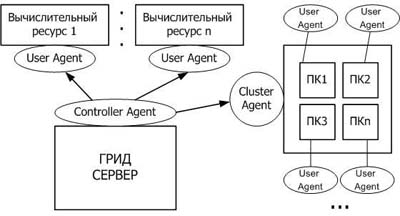Actuality
Actuality already existing means of creation of the Grid infrastructures, there is a number of the important scientific problems without which decision full-scale use of the Grid of technologies in a science is impossible. One of such is efficient control resources in the distributed environment. Absence of good system of communications of program agents considerably reduces efficiency of use of the Grid infrastructure. And consequently today an actual problem is creation of new model of communication of program agents (planning of tasks and resources).
Purpose
The purpose of the master's work is development of program agents for distributed calculations in the Grid environment, namely: program agents of dispatching and planning tasks, and also agents of the Grid computing resources. The important part of work is development of interfaces and protocols for interaction of the enumerated agents.
Scientific novelty
Scientific novelty of the algorithms are developed by software agents, which increase the scalability of the Grid computing and reduce the overall processing time jobs.
The Grid Computing
The Grid represents an infrastructure constructed on the Internet which provides scaled, safe, high-speed mechanisms for detection and access to remote computing and information resources (probably various architecture). At present the Grid Computing most actively develops.
The Grid Computing it is used as association computing computers and servers for the decision of challenges. The decision of such problems on the computer of the user, is represented extremely not effective, because of their long execution. The example of a Grid Computing is shown in figure 1.

Figure 1 - The example of a Grid Computing (5 frames, 5 repetitions, 128 KB)
At present the two-level organization of the Grid's resources actively develops. Thus computing resources are completely allocated in the Grid and cannot be used by owners. Also there is a single-level organization of the Grid's resources . Such kind of the Grid consists of local computers.
The basic task of a Grid is coordination of resources. For an efficient use of resources in a Grid agents are used [1].
Structure Grid on the basis of agents
«The agent is an essence which can accept the information from an environment and react to external indignations» [2].
Each agent is considered as the representative of a resource of a Grid. Each agent has the information and can cooperate with other agents.
The structure of the agent is shown in figure 2 [3]. The agent has two levels:

Figure 2 – Structure of the agent
In figure 3 the architecture of a Grid is shown. Thus Grid consists from:

Figure 3 – The architecture of a Grid
Protocols of interaction of agents
«The protocol is a maxims, which are applied in extreme points of telecommunication system during data exchange» [4].
Reports in the Grid should provide reliable transport and routing of messages.
In the Grid the stack of reports TCP/IP, namely IP, ICMP, TCP, UDP, HTTP, FTP are used.
Report HTTP is used in the majority of Grids for allocation of computing resources, monitoring and the control of calculations on resources. And report FTP - is the report of management of a data access, access to files. Report FTP is accepted as the base transfer protocol of data [4].
Reports in the Grid should carry out following functions:
Distinguish two basic classes of reports:
Functions of Agents
The basic
functions of the agent of the second level are:
Agents are installed on all executive computers. When resources of the executive computer were free, the agent informs on it the dispatcher, Requests on execution the new task. If tasks are not present, the agent through the certain moments of time requests the task again. If in queue of tasks there is a task the agent starts to carry out the task. The agent is responsible for division of resources.
Agents of levels send all information on the task (the execution status, quantity of the used resources) to the dispatcher through the certain moments of time. As soon as the Grid task was executed, agents send results to the dispatcher. All data coupled with the task leave from the local computer.
Agents of the first level, are installed on a server of a cluster and are responsible for the whole cluster [1] [8].
At a writing of this author's abstract final job is not finished yet. Definitive end: December, 2009.
The literature list:
- Березовский П.С., Коваленко В.Н. "Состав и функции системы диспетчеризации заданий в гриде с некластеризованными ресурсами", ИПМ им. М.В.Келдыша РАН, Москва 2007.
- Шелестов Ю.А.,Скакун С.В.,Куссуль О.М. "Агентный подход к реализации модели поведения пользователей Grid-систем", Институт космических исследований НАНУ-НКАУ.
- Гороховський С.С., Римарчук В.К. "Технологiя сiтки (Grid) i використання агентних платформ для задач планування", УДК 681.3:658.
- Я. Фостер, К. Кессельман, С. Тьюке "Анатомия ГРИД. Создание Масштабируемых Виртуальных Организаций", перевод с англ.: Карягин Д.А., ИПМ им. М.В.Келдыша РАН, Москва 2004.
- Коваленко В.Н., Корягин Д.А. "Организация ресурсов грид", ИПМ им. М.В.Келдыша РАН, Москва 2004.
- Коваленко В.Н., Коваленко Е.И., Шорин О.Н. "Разработка диспетчера заданий грид, основанного на опережающем планировании ", ИПМ им. М.В.Келдыша РАН, Москва 2005.
- А.Е. Дорошенко, А.П. Розенблат, К.А. Рухлис, Ю.М. Тырчак "МОДЕЛИ И СРЕДСТВА ПРОГРАММИРОВАНИЯ ГРИД-СИСТЕМ", Институт программных систем НАН Украины 2005.
- А.И. Аветисян, С.С. Гайсарян, Д.А. Грушин, Н.Н. Кузюрин, А.В. Шокуров "Эвристики распределения задач для брокера ресурсов Grid", Институт системного программирования РАН, 2004.
- Ян Фостер «Разные оттенки ГРИД», пер. Леонид Черняк, Издательство «Открытые системы».
- David W. Walker «Emerging Distributed Computing Technologies», Department of Computer Science, Cardiff University, PO Box 916, Cardiff CF24 3XF.

